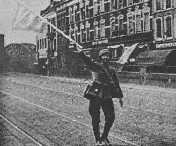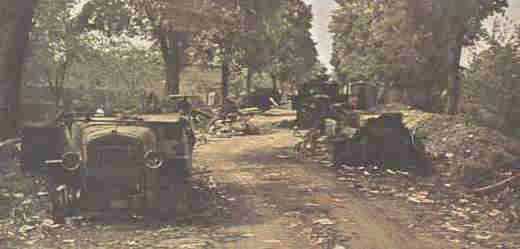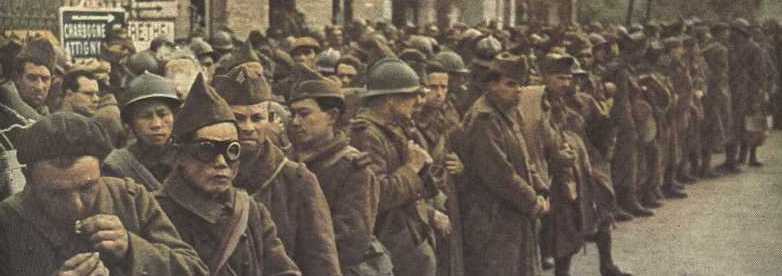|
INTRODUCTION (1)
THE
START OF WORLD WAR II
|
On
Friday September 1st, 1939 Nazi Germany attacked its Eastern
neighbour, Poland. By Sunday the 3rd, both Great Britain
and France, who had undertaken to support Poland in the
event of attack, were at war with Germany. A fortnight
later Soviet forces entered Poland from the east in accordance
with a pact made in August between Stalin and Hitler.
Whilst these two great monsters of the 20th
century were busily butchering Poland and its inhabitants
and imposing their brutal rule on that area of Europe
which rapidly came to include the Baltic states of Estonia,
Latvia and Lithuania, Great Britain and its allies waited
for the expected attack in the west. It was to be
a long wait and this period has subsequently become known
as the "Phoney War" - not that there could have
seemed anything "phoney" about it for those risking
their lives daily in the R.A.F. and the Royal and Merchant
Navies, nor those of our forces engaged in the futile defence
of Norway which together with Denmark was attacked by Germany
early on the morning of Tuesday April 9th, 1940.
But for most people in this country, it was a period of
relative calm, especially when compared with what was to
come. There had been a great flurry of activity in the weeks
immediately preceding and following the outbreak of war,
much of it based on the widespread assumption that overwhelming
aerial attack was imminent: thousands of children evacuated
from cities to safe areas, public buildings protected with
sandbags, air-raid shelters excavated and built, blackout
restrictions imposed on every household. But gradually
many of the evacuees had drifted back to their homes and
civilian life had once again approached some sort of normality
whilst everyone waited for what was to come next.
 The blow fell on the morning of Friday, May 10th, 1940 when
the country awoke to the news that Hitler’s forces had blasted
their way into Holland, Belgium and Luxembourg. Within hours
the Prime Minister, Neville Chamberlain, resigned and was
succeeded by Winston Churchill. The German Army and
Air Force (the Luftwaffe) were invincible. Despite
desperate attempts by the armies of Holland, Belgium and France
and the British Expeditionary Force to halt the
advance, Holland capitulated within eight days, on the 18th,
and on May 28th the Belgian army surrendered. The blow fell on the morning of Friday, May 10th, 1940 when
the country awoke to the news that Hitler’s forces had blasted
their way into Holland, Belgium and Luxembourg. Within hours
the Prime Minister, Neville Chamberlain, resigned and was
succeeded by Winston Churchill. The German Army and
Air Force (the Luftwaffe) were invincible. Despite
desperate attempts by the armies of Holland, Belgium and France
and the British Expeditionary Force to halt the
advance, Holland capitulated within eight days, on the 18th,
and on May 28th the Belgian army surrendered.
 In the ensuing fighting the B.E.F. was forced back towards
the sea, to Dunkirk, from where over a period of days and
wholly against the odds some 340,000 troops were evacuated,
leaving behind almost all their equipment. The Battle
of France continued for a little longer, but the mighty
French Army on which so much reliance had been placed was
quickly defeated and France delivered itself totally into
German hands on Saturday June 22nd, just six weeks after
the beginning of the campaign.
In the ensuing fighting the B.E.F. was forced back towards
the sea, to Dunkirk, from where over a period of days and
wholly against the odds some 340,000 troops were evacuated,
leaving behind almost all their equipment. The Battle
of France continued for a little longer, but the mighty
French Army on which so much reliance had been placed was
quickly defeated and France delivered itself totally into
German hands on Saturday June 22nd, just six weeks after
the beginning of the campaign.

As the French Army lined itself up to surrender, on the
British side of the Channel the country spat defiance, licked
its wounds and pondered on the future. Great Britain was
truly alone. Its main European allies were broken,
their territory, populations, arms, natural resources and
manufacturing capacity now in German hands. Of the
other major western European countries Italy had already
entered the war on the German side; Spain, another fascist
dictatorship, was neutral but sympathetic to Hitler; and
Switzerland, Sweden, Portugal and Eire were determinedly
asserting their neutrality. Further afield Stalin’s
Soviet Union, a natural enemy of Hitler, was still tied
to him by the pact of non-aggression cynically agreed between
them. Across the Atlantic, the sleeping giant of the
U.S.A. had a government which was opposed to tyranny and
broadly sympathetic to the British, but a population which
at that stage was reluctant to be dragged into another messy
European conflict. It was only the dominions and colonies
of the British Commonwealth - Australia, Canada, India,
New Zealand, Rhodesia, South Africa and others - who again
stood four-square behind the "Mother Country"
as they had so nobly done in the Great War only 25 years
earlier.
This support from the Commonwealth and help in the form
of military hardware supplied by the U.S.A. were Britain’s
only solace in a position of terrifying isolation and vulnerability,
the only country in Europe still fighting for the values
of freedom, humanity and civilisation. In Churchill’s
own words: "We were to find ourselves alone, almost
disarmed, with triumphant Germany and Italy at our throats,
with the whole of Europe open to Hitler’s power, and Japan
glowering on the other side of the world." And
again in his own words, the Battle of France was over and
the Battle of Britain was about to begin.
Whilst the attack on western Europe had been long expected,
the speed and scale of the defeat in May and June 1940 most
certainly had not. It had taken just six short weeks for
Great Britain to find itself without a single European ally
and facing across a twenty mile stretch of water the most
formidable force in the world, well armed, well trained,
seemingly invincible and eager to finish the job. And this
mighty military machine, the British people knew, was controlled
by a regime the depths of whose wickedness and brutality
were already strongly suspected, even though incontrovertible
proof would have to wait for a further four and a half years
to be revealed to a horrified world.
In
the face of this threat, what preparations were in place
to ensure the effective
DEFENCE
OF GREAT BRITAIN'S POPULATION?
|